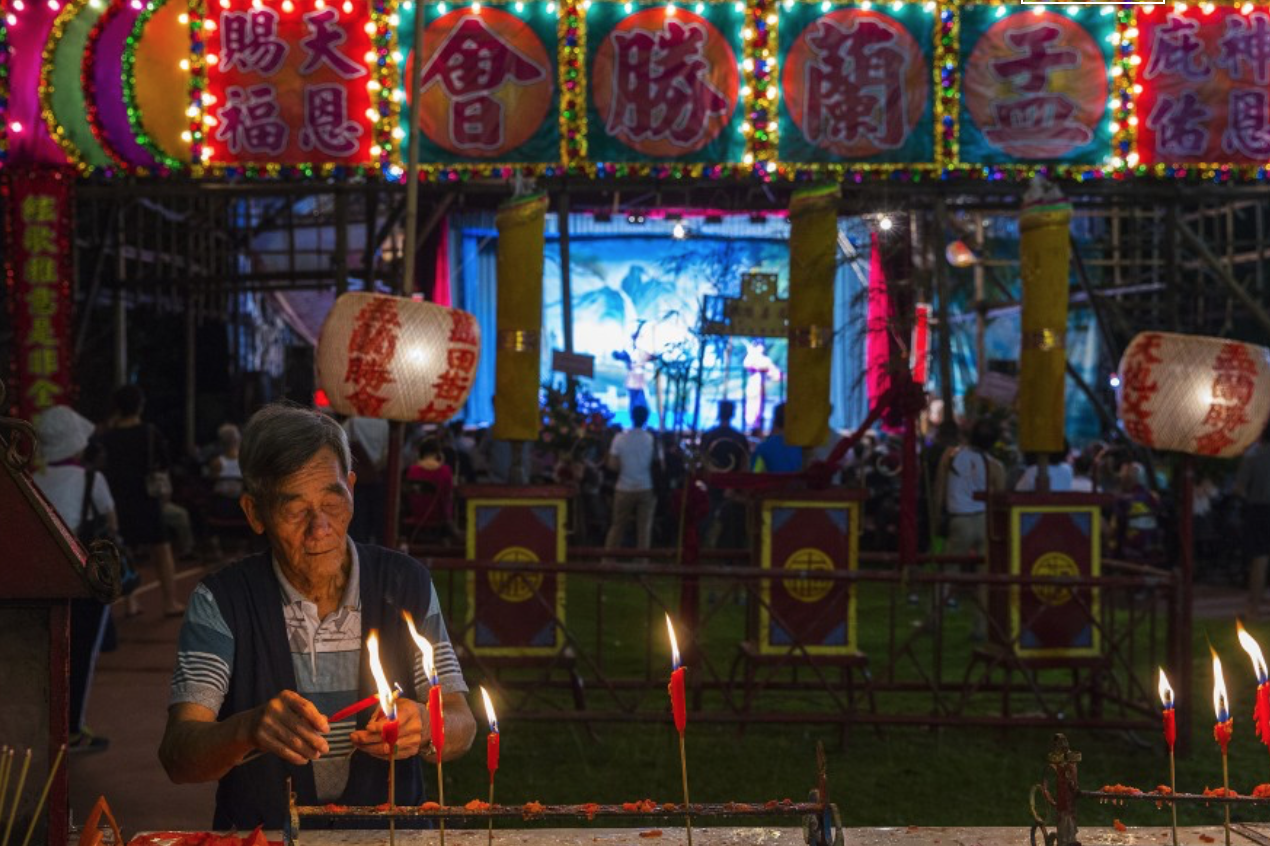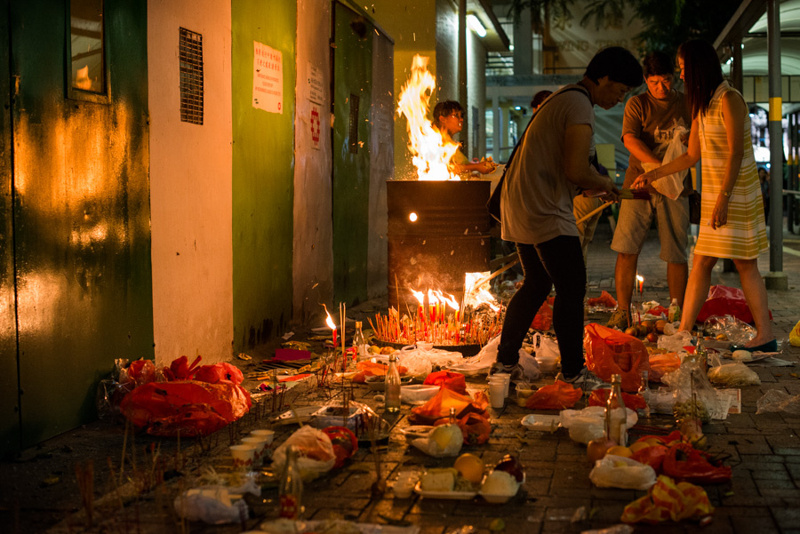One night a couple years ago, I was walking back to my apartment in the Jordan neighborhood of Hong Kong, when my path on the narrow sidewalk was almost completely blocked by a spread of food.
White styrofoam containers full of glazed, crispy skin chicken, fried noodles, dark green vegetables, and Chinese barbecued pork lay open on the sidewalk next to a tin of smoking incense. Nearby, a woman was busy standing over a large metal bowl, feeding colored paper into an orange flame.
The fresh, tidy “banquet” sat in contrast to the patina of ages old grime that shaded the concrete and tile buildings that populated my part of Kowloon, the peninsula that along with Hong Kong island makes up the city of my birth.
Looking further down the street, a street popular with superhero filmmakers to portray “gritty”, and “Asian”, the copious neon signs advertising restaurants, spas, and jewelry shops looked dreamy under the haze of more incense, and smoke leaping from fires in metal bowls and barrels. The smell of greasy food and burning paper filled my nose, a sweet, earthy smell that almost covered the scent of sweat, salt water, and garbage that perpetually perfumes Hong Kong.
Don’t get me wrong, “sweat, salt water, and garbage” may not sound like a treat for the senses, but something about the smell of Hong Kong soothes my soul.
However that night, mine was not the soul to be soothed. It was the Hungry Ghost Festival in Hong Kong, and the streets were alive with offerings to the dead.

The Hungry Ghost Festival or Yu Lan is the time of year when, in Taoist and Buddhist beliefs, the gates to the spirit world are opened and the deceased walk the earth again searching for their living relatives, potentially angry, and definitely hungry.
In places like Hong Kong, China, Taiwan, Thailand, Malaysia, and Japan, the seventh month of the lunar calendar is considered ghost month (a little different every year on the western calendar, this year ghost month was August 22 to September 19). The 15th day of ghost month culminates with the Hungry Ghost Festival. On this day it is vital to offer sustenance to your dead ancestors – or any other ghosts that might cross your path.
Otherwise they will haunt you, or even worse, curse you.
Haunt you or curse you. Though I definitely respect the seriousness with which many people – including some in my family – approach ghost month and the Hungry Ghost Festival, as a child growing up straddling old Hong Kong superstition and wanting my MTV, the threat of, “Ai-yah! You’d better be respectful, or your ancestors will haunt you and curse you with bad luck, “lah,” seemed to be the warning attached to every ritual, event, or holiday.
I think my mom even worked it into Christmas somehow.
It’s just fascinating to me that in cities like Hong Kong, that are known largely for their modernity and fast-paced business dealings, fear of retribution from ghosts and the dead still permeate the society. But I digress.
During ghost month, the ghost gates open at sunset, and the spirits are free to roam the realm of the living in order to seek out their relatives. The ghosts might be angry because they were not ready to die, they have unfinished business, or they are in Hell. One reason a spirit goes to the deepest pits of Hell is because their family mistreated them, forgot them, or didn’t properly bury or cremate their body.
One more thing to blame your ungrateful children for. “Thanks for sending me to Hell, you guys.”
Additionally roaming the earth as an angry disembodied spirit makes you HUNGRY.
HANGRY.
HANGRY GHOST FESTIVAL.
We were all thinking it.

So in order to appease the spirits, the family must lay out food for the dead – usually outdoors, sometimes in the home. Not a few scraps, not a cookie or leftovers, we’re talking actual, fresh food. Some say you should provide the best you can afford.
Hence the mouthwatering banquets laid out on the street in my scrappy part of town. Even the homeless didn’t dare touch the food laid out for the ghosts. (I did see a cat steal some pork once – but cats are assholes and familiars of the dead so…)
For the entire ghost month, my street in west Kowloon was never without take-away boxes of food placed on the sidewalk after dark. Some laid out red cloth or flowers for the food to sit on, others placed bottles of water or beer alongside the offerings. It was all about giving people’s ancestors their favorite foods, or pleasing passing spirits so they wouldn’t bother the inhabitants of someone’s home or shop.
I’m not quite sure what happened to the food laid on the sidewalks after the ghosts had a taste. Since Hong Kongers are superstitious yet practical, I suspect the food ended up being consumed. I rarely saw leftovers sitting out in the morning (thought I often saw the remnants of a squashed meal that had been run over by a car).
Of course, not all ghosts can find their families. Sometimes, the dead return to the home where their family used to live, only to find a stranger living there. Woe be to the stranger who doesn’t acknowledge the dead!
If nothing else, whether you’re planning on hosting your returning ancestors or not, it’s recommended that you always have a light on in your home – as ghosts hide in the shadows – and always have at least a small offering of food out. An orange, perhaps a beer. Above all, the dead must not be forgotten.
Oh, and first rule of ghost month, don’t talk about ghost month. Specifically the ghosts of ghost month. Hauntings and curses abound.
There are actually a lot of rules to follow during ghost month and the Hungry Ghost Festival. Among them are:
1) Don’t begin a new job, get a new home, get married, be born, or do anything new during ghost month. Your new beginning may be doomed. If you have to be a special snowflake and be born during ghost month, only celebrate your birthday during the daylight hours.
2) Ghosts are drawn to red, so don’t wear red or else a ghost may attach itself to you.
3) Don’t pee on a tree. A ghost may be living in that tree.
4) Always close exterior doors, you don’t want to invite in wandering ghosts.
5) Don’t lean on walls – ghosts stick to walls.
6) Never disturb a ghost’s food and offerings. If you do, apologize profusely.
7) The night is not yours during ghost month, it’s for the dead. Unless it’s in honor of them, don’t do things outside after dark.
Along with food, the living also burn paper for the dead. At night, little charred bits of Hell banknotes would float through the air in my neighborhood.
Yes, the dead have their own currency, and it’s the job of the living to make sure the dead have enough money in the afterlife to maintain the life they were accustomed to. So Hell banknotes are purchased from shops devoted to selling paper goods for the dead – including but not limited to paper computers, cell phones, iPads, cars, and designer clothing – and burnt in order to make a deposit into the dead’s wallet. These days, the dead can have pretty much any luxury they want – as long as their family burns it.
On the night of the Hungry Ghost Festival, the link between the world of the living and the world of the dead is strongest. Families often hold banquets in their home, honoring the dead with empty chairs at the table, held for the guests of honor. The plates for the dead are heaped with their favorite food, their cups filled with their favorite drink.
Part of pleasing the dead is entertaining them, so public music and dance performances may take place in the street or parks. In Hong Kong, Chinese opera companies hold pop-up performances in public places to honor of the dead and the deities. Colorful, temporary shrines and temples appear throughout the city, so that people can stop to pray for the dead.
After the festival and ghost month concludes, if families have done right by their dead, they can go back to the spirit realm with a full belly, a happy heart, and a heavier ghost-wallet. Until next year.
I love ghost month in Hong Kong. I was lucky enough to be there for the tail end of it this year. And though the offerings after the 15th day of the lunar calendar had largely been reduced to incense and oranges, maybe some sweets, there was still an air of remembrance and ritual on the streets of my old neighborhood. Even as the area slowly gentrifies with the enormous cultural center being built on the harbor, the Ritz-Carlton’s tallest bar in the world only streets away from historic Shanghai Street, and posh European-looking apartment buildings dotting the neighborhood, the 2,000-year-old Hungry Ghost Festival endures.
Whether you believe in ghosts or not, the Hungry Ghost Festival is a time to think about the dead. More than the dead, one’s dead family. Since many in Asia believe that the spirit survives when the body fails, you might consider this just another way to care for your dead.
On one of the last nights of ghost month this year, I walked past a women in Jordan tending a fire in a squat, metal barrel. Taxis zipped past her, a loud group of people who were headed to the next bar jostled by, a nearby convenience store unloaded boxes from a truck. Life bustled around her, the city went about its business. But she just quietly, meditatively stoked the fire. From a distance, I watched her burn some paper offerings. They incinerated in a little puff of smoke that rose to the heavens.
And that is the beauty of the Hungry Ghost Festival. Under the glow of neon signs, Hong Kong is aggressive about moving forward, forward, forward, faster, faster, faster – chasing life. In a way, Hong Kong is aggressively alive.
But amidst that bright, unyielding life, there is some peace in knowing that lurking in the shadows, there is still room for the dead.
Louise Hung is an American writer living in Japan. You may remember her from xoJane’s Creepy Corner, Global Comment, or from one of her many articles on death, folklore, or cats floating around the Internet. Follow her on Twitter.


